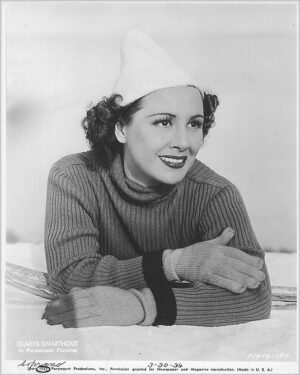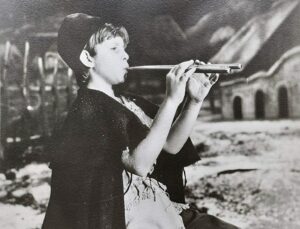“La Rondine,” absent from the Met since 1936 performances with Lucrezia Bori, reappeared at the house on December 31 in the peripatetic Nicolas Joel production. Previously seen at Covent Garden and in Toulouse, the staging made its stateside bow in 2007, imported for the San Francisco Opera debut of Angela Gheorghiu, who also made Magda’s bittersweet “flight” into a memorable star turn here.
The attractive Art Deco production – Ezio Frigerio’s tile, beam, fresco and stained-glass sets, Franca Squarciapino’s flapper-era costumes, the whole gorgeously lit by Duane Schuler – probably has more impact in a smaller house. On the vast Met stage, each of the three sets looked like what the third really “was” (a hotel lobby); perhaps this was what led stage director Stephen Barlow to encourage his leading couple’s bent for rather stagy poses to seize focus at dramatic moments. But it was a colorful, charming show to experience on a wintry night. Marco Armiliato seems finally to be gaining due appreciation from Met audiences and management for his reliably idiomatic, animated conducting. Although the Met orchestra lacked the bone-deep familiarity that its players bring to “Bohème” or “Tosca,” under Armiliato’s baton it provided a satisfying introduction to this delightful, deceptively “light” Puccini score to those who have managed to miss “La Rondine”s many outings at New York City Opera over the past quarter-century.
Gheorghiu, the project’s raison d’être, looked sensational as Magda – far too much so, sartorially, for the scene at Café Bullier, in which she masquerades as the simple “Paulette.” Squarciapino’s lovely, flatteringly cut floral print dress and fetching hat made the (supposedly) disguised Magda the best-dressed woman present; so why would her maid Lisette tell her she’d resemble her mistress “if she were more elegant”? Gheorghiu’s beautiful soprano has seemingly diminished in volume, proving hard to hear (from the sixteenth row) in midrange; past the [first] aria – in which Gheorghiu pulled ahead of Armiliato’s beat – she formed lovely, shining arcs of sound in her fine, fuller high register, save for a few slightly spin-free climaxes. The Romanian soprano is one of very few singers in her generation to offer consistently thoughtful and stylish verismo phrasing; one applauded her musical intelligence and ability to color words. She’s a knockout and a clever artist (two prime assets for any Magda) but in the final analysis, her characterization – a series of seemingly calculated poses of nonchalance – emerged mildly touching rather than moving.
Romanian tenor Marius Brenciu, in his Met debut, showed the qualities for a fine Ruggero – bright lyric voice with fine dynamic shading plus a dramatically agile, quietly sexy but vulnerable stage presence. Unfortunately, Brenciu here sang Prunier, while Ruggero was Roberto Alagna. Alagna has shown Met audiences (particularly in Carmen) that he can act very well indeed. Left to himself, he exudes a breezy self-satisfaction that proved quite wrong for Puccini’s shy, parent-dominated provincial character. Flirt with pretty, worldly women in salons and cafes? Deal for the first time ever with a Parisian waiter (surely every young man’s nightmare)? “Pas de probleme” for this cocky charmer. Why, then, would Magda have perceived him as different from the men populating her milieu? More important (and distressing), the French tenor’s voice sounded grainy and dry, effortful on high notes often requiring extra breaths. The youthful tone of EMI’s 1997 “Rondine” recording seemed largely vanished – though glimmers shone through in his upper-middle voice in Act III, leading one to hope that perhaps some reevaluation of his recent heavy repertory choices might lead to renewed lyrical luster from this gifted tenor.
Lisette Oropesa made a silver-toned, lively, droll maid/wannabe actress, mercifully without caricature. One measure of the production’s star-centeredness lies in its according less attention to the complex interaction between Magda and Lisette than any “Rondine” I’ve ever seen: their relationship consisted mainly of fond smiles. Among Magda’s circle, David Won (Perichaud), David Crawford (Crebillon) and mezzo Elizabeth DeShong (another debutante, as Suzy) sounded freshest. Samuel Ramey’s dignified Rambaldo produced richly resonant but undeniably vibrato-ridden tone. Idiotically, the production brings him onstage for a final triptych tableau with the stricken Ruggero (Alagna acted creditably here) and the anguished, departing Magda – thus also denying us the libretto’s brilliant stroke of having us hear the last sigh of this “swallow” offstage as she begins her new journey. Puccini also used offstage floated high notes in “Bohème,” “Butterfly” and “Suor Angelica;” one presumes he wanted the effect thus produced.
Born on this day in 1905 composer Jule Styne.
Happy 86th birthday mezzo-soprano Eva Randová.Born on this day in 1908 baritone Marko Rothmüller.Happy 64th birthday conductor Graeme Jenkins.
Photo: Ken Howard / Metropolitan Opera



